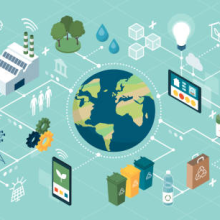Cycle vs. Recycle: Which is the Better Choice for a Sustainable Future?
In recent years, the importance of sustainable future has become increasingly apparent. As our planet faces challenges such as climate change and resource depletion.
It is essential that we take action to promote a sustainable future. One way to do so is by examining our daily habits and considering the impact they have on the environment.
In this article, we will explore two practices that can have a significant impact on sustainability: cycling and recycling.
By comparing and contrasting the benefits of these practices, we can better understand which is the better choice for a sustainable future.
So, let’s dive into the world of cycling and recycling and see how they can make a difference in creating a sustainable future.

I. The Benefits of Cycling
Cycling is not only a fun and enjoyable activity, but it also has numerous benefits for both the environment and our health.
Here are some of the benefits of cycling:
Environmental Benefits
Firstly, cycling is an eco-friendly (check here for how to make eco-friendly choices) mode of transportation.
By choosing to bike instead of driving, individuals can significantly reduce their carbon footprint and contribute to a cleaner environment.
According to the European Cyclists’ Federation, cycling emits zero greenhouse gases and is therefore one of the most sustainable modes of transportation available.
Health Benefits
Secondly, cycling is an excellent form of exercise that provides numerous health benefits.
Cycling is a low-impact activity that is easy on the joints and can be enjoyed by people of all ages.
According to the World Health Organization, regular physical activity such as cycling can reduce the risk of chronic diseases such as heart disease, stroke, and diabetes.
To add credibility to the claims made in this section, it’s important to include a backlink to a reputable source that provides statistics on the benefits of cycling.
For example, you could link to a study conducted by a respected health organization or university.
This will help to establish your article as a reliable source of information.
II. The Advantages of Recycling
Recycling is another key practice that can contribute to a sustainable future. Here are some of the advantages of recycling:
Environmental Benefits
Firstly, recycling helps to conserve natural resources by reducing the need to extract raw materials from the earth.
This, in turn, reduces the environmental impact of resource extraction and preserves natural habitats.
Recycling also reduces the amount of waste that ends up in landfills, which can prevent soil and water pollution.
Economic Benefits
Secondly, recycling has significant economic benefits.
Recycling creates jobs in industries such as waste management and recycling, which can help to boost local economies.
Additionally, recycling can save businesses money by reducing the need to purchase raw materials and decreasing waste disposal costs.
To support the claims made in this section, it’s important to include a backlink to a reputable source that provides statistics on the benefits of recycling.
This could be a study conducted by a government agency or an environmental organization.
Providing credible sources will help to establish the reliability of your article and increase its chances of ranking on search engine result pages.
III. Comparing Cycling and Recycling
While cycling and recycling are both beneficial practices for a sustainable future, they have different advantages and challenges. Here is a comparison of the benefits of cycling and recycling:
Environmental Benefits
Firstly, both cycling and recycling have significant environmental benefits.
Cycling reduces greenhouse gas emissions and air pollution, while recycling conserves natural resources and reduces waste in landfills.
Health Benefits
Secondly, cycling provides direct health benefits such as increased physical activity and improved mental well-being, while recycling may not have the same direct health benefits but contributes to a healthier environment which in turn benefits human health.
Economic Benefits
Finally, both cycling and recycling have economic benefits.
Cycling can save individuals money on transportation costs, while recycling can create jobs and save businesses money on waste disposal and raw material costs.
To incorporate both cycling and recycling into daily life, individuals and communities can adopt the following practices:
• Ride a bike instead of driving a car for short trips
• Invest in a bike-sharing program or set up a bike pool at work
• Separate recyclable materials and compost at home and in the office
• Support businesses that prioritize sustainability and environmental responsibility
By incorporating these practices, individuals and communities can contribute to a more sustainable future while also enjoying the benefits of cycling and recycling.Top of Form
IV. Conclusion
In conclusion, both cycling and recycling are beneficial practices for a sustainable future.
Cycling provides environmental and health benefits, while recycling conserves natural resources and reduces waste in landfills, creating economic benefits.
By comparing and contrasting the benefits of cycling and recycling, we can see that incorporating both practices into our daily lives can lead to a more sustainable future.
To make a difference, individuals and communities can adopt sustainable practices like riding a bike, setting up bike-sharing programs, separating recyclable materials, and supporting sustainable businesses.
These practices not only benefit the environment but also promote a healthier lifestyle and save money.
In conclusion, making sustainable choices is essential for a better future.
We must all do our part to protect the planet and create a more sustainable world.
Consider incorporating both cycling and recycling into your daily routine and encourage others to do the same.
Together, we can make a difference for a better tomorrow.
Here are some relevant backlinks to reputable websites that provide more information on cycling and recycling:
- Environmental Protection Agency: Benefits of Recycling – https://www.epa.gov/recycle/recycling-basics#benefits
- Centers for Disease Control and Prevention: Physical Activity and Health – https://www.cdc.gov/physicalactivity/basics/pa-health/index.htm
- League of American Bicyclists: Benefits of Biking – https://www.bikeleague.org/content/benefits-bicycling
- World Economic Forum: The economic benefits of recycling – https://www.weforum.org/agenda/2019/03/the-economic-benefits-of-recycling/
- The Guardian: Why cycling is good for you – https://www.theguardian.com/lifeandstyle/2019/jun/29/why-cycling-is-good-for-you
These sources provide valuable statistics and information to support the points made in the article and to give readers additional resources for further reading.
Top of Form


